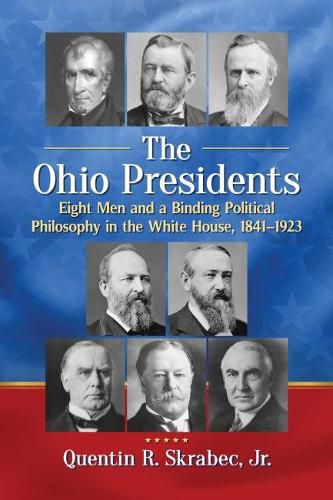Readings Newsletter
Become a Readings Member to make your shopping experience even easier.
Sign in or sign up for free!
You’re not far away from qualifying for FREE standard shipping within Australia
You’ve qualified for FREE standard shipping within Australia
The cart is loading…






This title is printed to order. This book may have been self-published. If so, we cannot guarantee the quality of the content. In the main most books will have gone through the editing process however some may not. We therefore suggest that you be aware of this before ordering this book. If in doubt check either the author or publisher’s details as we are unable to accept any returns unless they are faulty. Please contact us if you have any questions.
The book offers a unique view of the populism and republicanism of Ohio and the Midwest, which resulted in the election of Ohio Presidents from 1866 to 1920.
Ohio claims eight presidents (one Whig and seven Republicans) during a period from 1841 to 1923: William Harrison (1841-1841), U. S. Grant (1869-1877), Rutherford Hayes (1877-1881), James Garfield (1881-1881), Benjamin Harrison (1889-1893), William McKinley (1897-1901), William Taft (1909-1913), and Warren Harding (1921-1923). What is unique about the Ohio presidents is that their industrial policies, nationalism, and social beliefs formed unified philosophy and a legacy. It was a shared view of a Midwestern educational system. It was not the idea of any one president but the people that elected them. From 1860 to 1930, Ohio republicanism dominated politics across the America. The simple definition of that legacy might be called Ohio republicanism. While it was integral to the Republican Party of the period, it cannot be viewed through the eyes of the Republican Party alone. Ohio republicanism was an alliance of social, Christian, populism, nationalism, industrialism, and conservative economics. It initially was populism in search of a party with pieces from the Whig, Democrat, and Republican Parties. It morphed from the Whig Party of Abe Lincoln to end slavery and swallowed up a group of specific purpose parties under a national banner, such as the Abolition and Free Soil Parties. The ghost of Ohio republicanism is still seen today.
$9.00 standard shipping within Australia
FREE standard shipping within Australia for orders over $100.00
Express & International shipping calculated at checkout
This title is printed to order. This book may have been self-published. If so, we cannot guarantee the quality of the content. In the main most books will have gone through the editing process however some may not. We therefore suggest that you be aware of this before ordering this book. If in doubt check either the author or publisher’s details as we are unable to accept any returns unless they are faulty. Please contact us if you have any questions.
The book offers a unique view of the populism and republicanism of Ohio and the Midwest, which resulted in the election of Ohio Presidents from 1866 to 1920.
Ohio claims eight presidents (one Whig and seven Republicans) during a period from 1841 to 1923: William Harrison (1841-1841), U. S. Grant (1869-1877), Rutherford Hayes (1877-1881), James Garfield (1881-1881), Benjamin Harrison (1889-1893), William McKinley (1897-1901), William Taft (1909-1913), and Warren Harding (1921-1923). What is unique about the Ohio presidents is that their industrial policies, nationalism, and social beliefs formed unified philosophy and a legacy. It was a shared view of a Midwestern educational system. It was not the idea of any one president but the people that elected them. From 1860 to 1930, Ohio republicanism dominated politics across the America. The simple definition of that legacy might be called Ohio republicanism. While it was integral to the Republican Party of the period, it cannot be viewed through the eyes of the Republican Party alone. Ohio republicanism was an alliance of social, Christian, populism, nationalism, industrialism, and conservative economics. It initially was populism in search of a party with pieces from the Whig, Democrat, and Republican Parties. It morphed from the Whig Party of Abe Lincoln to end slavery and swallowed up a group of specific purpose parties under a national banner, such as the Abolition and Free Soil Parties. The ghost of Ohio republicanism is still seen today.